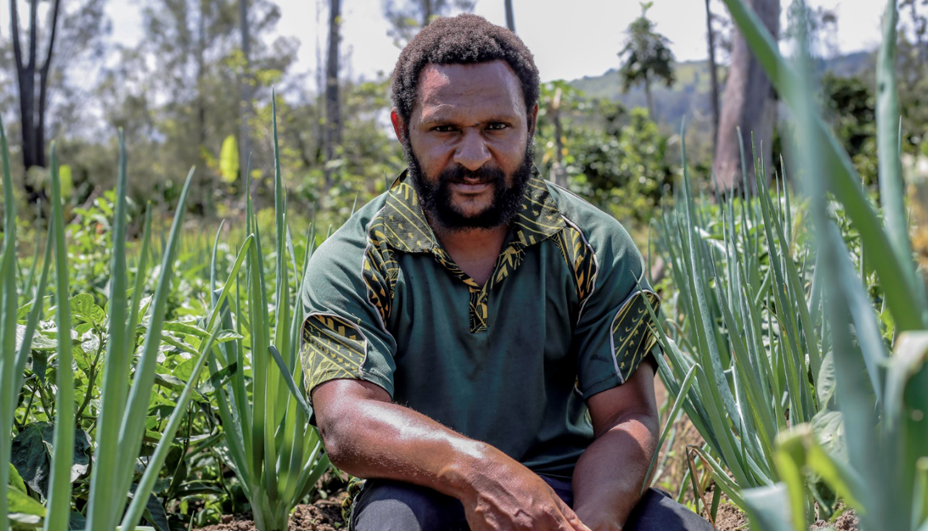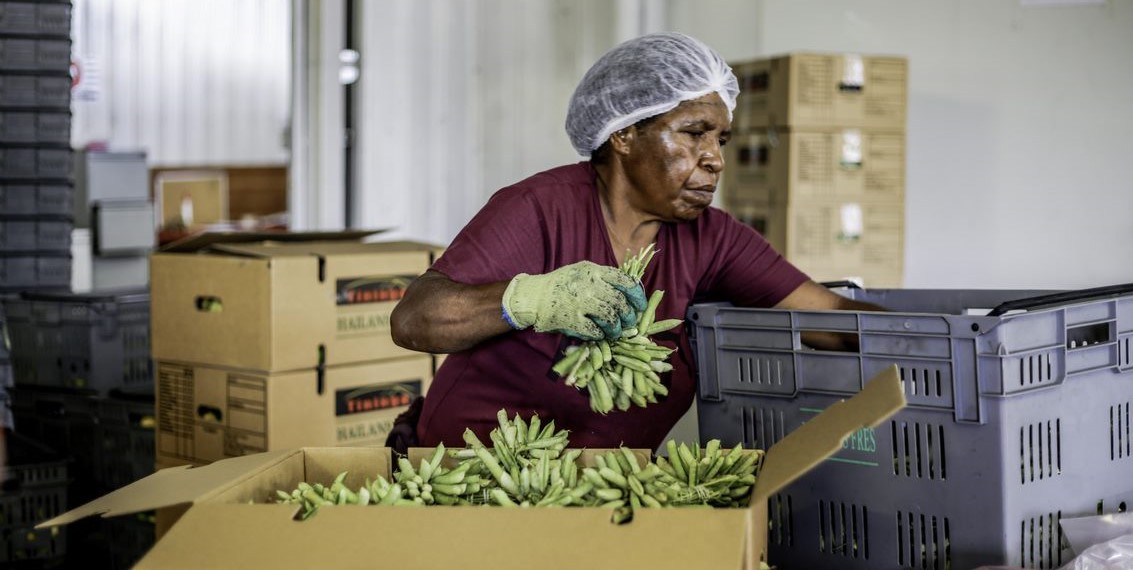 John Pekri switched from growing pineapples and peanuts to capsicums, giving him a stable and growing market for his produce.
John Pekri switched from growing pineapples and peanuts to capsicums, giving him a stable and growing market for his produce.
For years, John Pekri cultivated his land in Papua New Guinea’s Wahgi valley, growing pineapples and peanuts. He readily admits it was a tough life.
His farm lies on extremely productive land in an area renowned for its fertility. Farming practices have changed little over the years, with most crops grown to feed families and the excess sold at the local markets.
Unfortunately, there was little appetite at Pekri’s local market in Mt Hagen for his pineapples. But he capitalized on an opportunity to grow and earn more – by cultivating capsicum and supplying to local fresh produce wholesaler, Tininga. Working with Tininga also gave Pekri access to training and knowledge about how to improve his farming practices.
“Tininga and IFC hosted a workshop where I saw a film of an African corn farm and I saw how water was being channeled and it caught my interest. So, I returned and surveyed my land and saw how water could flow,” he said.
Pekri and his neighboring farmers set up an irrigation system and learnt how to space and plant crops to improve productivity. “In 2013, I planted a small field with about 1,500 seeds and now I plant about 3,000 or 4,000 seeds,” he says.
Pekri’s income has more than tripled. He plans to build his family a new house and lay pipes to supply water to his village. He now has between 20 to 25 people from five different families from his local community working the land. With the extra funds, the community has built a church.
“We wanted to take the farmers into a situation where they think and operate as a business, not an activity that’s done occasionally,” says agronomist, Cathy Wali, on site in Mt Hagen.
For three years, Wali has conducted farm management training, as well as training in financial literacy to help farmers. The training was set up by IFC’s agri-business advisory services and Tininga, under a project supported by the governments of Australia and New Zealand. IFC’s support was aimed at helping Tininga improve the quantity and quality of fresh produce from farmers to markets.
Tininga’s Managing Director Pat Duckworth estimates thousands of farmers have benefited. “There has been farming here in Mt Hagen for some 10,000 years. Mt Hagen farmers are very enterprising men and women,” Duckworth says. “The secret was to provide a market for them and in providing that market, therein lies the opportunity.”
By supplying their produce to Tininga, the farmers’ yield goes to Papua New Guinea’s growing capital, Port Moresby – where demand for fresh produce has been increasing, but where the majority of fresh produce is imported.
“There is no road over the mountains to the capital, which means transport is done by aircraft. It’s very expensive and the smallholder farmer simply can’t afford that,” says IFC’s agri-business specialist, Christian Reichel. “One of the improvements was to transport the cargo by road to Lae, and then by sea to Port Moresby, in refrigerated containers.”
“Three years after we started, the volumes of fresh produce and the numbers of farmers that are supplying us have increased dramatically,” says Peter Laka, depot manager for Tininga.
Tininga’s Hilans Fres operation now ships five to six containers per week, mainly to Port Moresby which amounts to about 160 tonne of fresh produce per month.
Laka says using refrigerated containers means Tininga is ahead in terms of its competitors, who are shipping produce in dry containers. “Ours is refrigerated all the way to Port Moresby so the loss rate of produce is about two to five percent, while others can lose up to 50 percent transporting by traditional containers.”
Having access to fresh produce is very important in Papua New Guinea, where the rate of stunting among children is one of the highest in the world, according to the World Bank’s Human Capital Index report.

And with 80 percent of the population making a living from the land, success with farmers and Tininga has spurred IFC to look to do more to inject private sector interest in other fertile farming areas around Papua New Guinea.
“Agriculture accounts for about a third of the country’s gross domestic product, but it’s inefficient, uncompetitive and shows declining productivity,” Reichel says. “There is a missed opportunity to farm good land across the country and that’s what we want to change – to reduce reliance on food imports, lower undernutrition rates and reduce unemployment.”
Back at the warehouse in Mt Hagen, Laka says he sees changes every day in the livelihoods of local farmers.
“Farmers are actually building permanent houses from the proceeds of their sales to Tininga,” he says. “They are telling us wonderful stories about sending kids to school from the money they get from selling to Tininga. Some groups are organizing themselves to bring in electricity to their villages. Our own people are benefitting from selling to us and that’s a satisfaction in itself.”